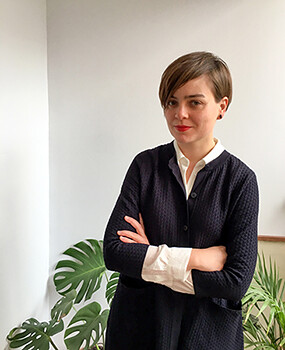Cofounder of MAIO Studio wins for her proposal, Kitchenless City: Architectural Systems for Social Welfare
Harvard University
Graduate School of Design
48 Quincy St
Cambridge, MA
www.wheelwrightprize.org
Twitter / #WheelwrightPrize
Harvard University Graduate School of Design (GSD) is pleased to name Barcelona architect Anna Puigjaner the winner of the 2016 Wheelwright Prize, a 100,000 USD traveling fellowship aimed at fostering investigative approaches to contemporary design. Puigjaner is a graduate of the Escola Tècnica Superior d’Architecture de Barcelona-Universitat Politècnica de Catalunya (ETSAB-UPC) (BArch 2004, MArch 2008, and PhD 2014). In 2005, she cofounded MAIO Studio with partners Maria Charneco, Alfredo Lérida, and Guillermo López. MAIO operates as a collaborative studio and has completed several projects, spanning exhibition design, furniture, interiors, public spaces, urban planning, and architecture. In summer 2016, the firm will complete its first construction from the ground up, a 22-unit, six-floor residential building in Barcelona.
Puigjaner’s winning proposal, Kitchenless City: Architectural Systems for Social Welfare, takes as its starting point a historic housing type—housing blocks with collective kitchens, as well as other shared amenities such as dining rooms, lounges, service areas. Puigjaner proposes to study exemplars of collective housing in Brazil, Sweden, Russia, Korea, and elsewhere, which reflect a variety of approaches to organizing and distributing domestic spaces. Noting that this housing type and notion of collective life were “deeply understood as a tool for social transformation,” she sees its relevance to today’s housing dilemmas and possible lessons for “renewed domestic proposals for the present.”
“Contemporary discussions of housing need to benefit from radically fresh ideas,” remarked Wheelwright Prize juror and GSD Dean Mohsen Mostafavi. “Puigjaner’s project, Kitchenless City, provides a new spatial imaginary for the consideration of dwelling in an increasingly diverse world. Her project perfectly captures the intention of the Wheelwright Prize, to spur discovery and find new possibilities for architecture.” The 100,000 USD grant will fund Puigjaner’s travel-based research over the next two years.
The research builds on work Puigjaner initiated several years ago, while pursuing her PhD. She has published articles on the subject, contributing essays to Space Caviar’s SQM: The Quantified Home (Lars Muller, 2014) and Volume (2013, #. 3). Kitchenless City also reflects MAIO Studio’s particular interest in flexible systems and the potential of variation, ephemerality, and appropriation. Its finalist submission to the MoMA PS1 Young Architects Program in 2014, Rooms: No Vacancy, consisted of a grid of rooms offering a succession of different atmospheres and moods. For the 2015 Chicago Architecture Biennial, MAIO created Floating, a series of inflated columns that traveled throughout the Chicago Cultural Center. This drew from previous MAIO projects, Floating: Urban Activator (Barcelona, 2011) and Urban Space System (Barcelona, 2014), which utilized flexible devices to delineate new gathering spots or “monuments” in public spaces.
Puigjaner and her MAIO partners combine design work with academic, research, and editorial activities. The studio currently directs the magazine Quaderns d’Arquitectura i Urbanisme. Their work has been published in magazines including Domus, AIT, Blueprint, A10 and Detail, and has been exhibited at the Art Institute of Chicago; Museum of Modern Art, New York; and the Venice Biennale. Puigjaner teaches at the School of Architecture of Barcelona and Massana School of Arts and Design, and she has lectured at the architecture schools of Columbia University, Yale University, Universidad Politécnica de Madrid, Washington University, among others.
The Wheelwright Prize is now in its fourth year as an open international competition for early-career architects. This year, the Wheelwright Prize jury selected four finalists from among nearly 200 submissions. (Their presentations may be viewed at www.gsd.harvard.edu, under the Media section.) The 2016 finalists were:
–Samuel Bravo (BArch 2009, Pontifical Catholic University of Chile), a Chilean architect whose work explores the relationship between traditional building practices and contemporary architectural production
–Matilde Cassani (BArch 2005 and PhD 2013, Politecnico di Milano), an Italian architect with an interest in the spatial implications of cultural pluralism in the contemporary Western urban context
–Pier Paolo Tamburelli (MArch 2002, University of Genoa; Advanced MArch 2004, Berlage Institute), cofounder of Milan-based baukuh architects, who proposed to create an “Atlas of the Wonders of the Modern World,” a survey of contemporary “ritualistic” landscapes
2016 Wheelwright Prize Jury: Eva Franch, Jeannie Kim, Kiel Moe, Rafael Moneo, Benjamin Prosky, Mohsen Mostafavi, and K. Michael Hays. (For extended biographies, visit wheelwrightprize.org.)
To download the winner’s brochure, which includes juror comments and the winner’s portfolio, go to www.wheelwrightprize.org.
Inquiries: Cathy Lang Ho at [email protected] / Twitter: Cathy Lang Ho



